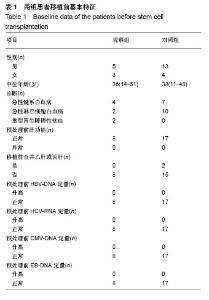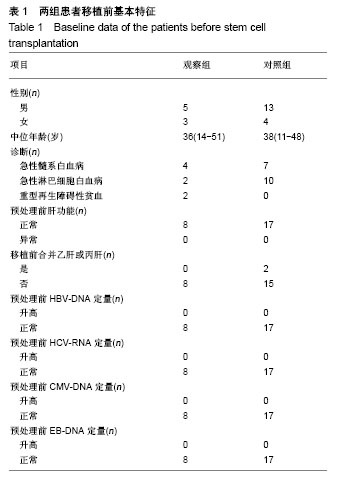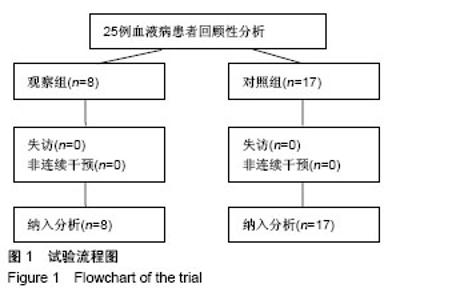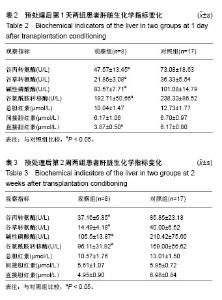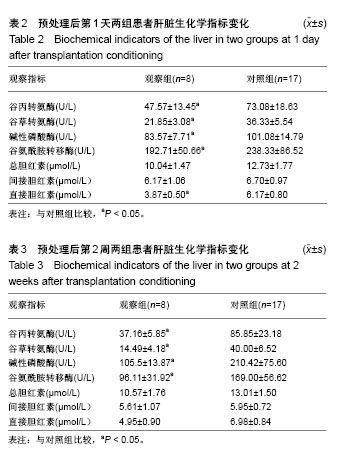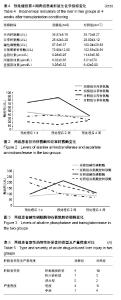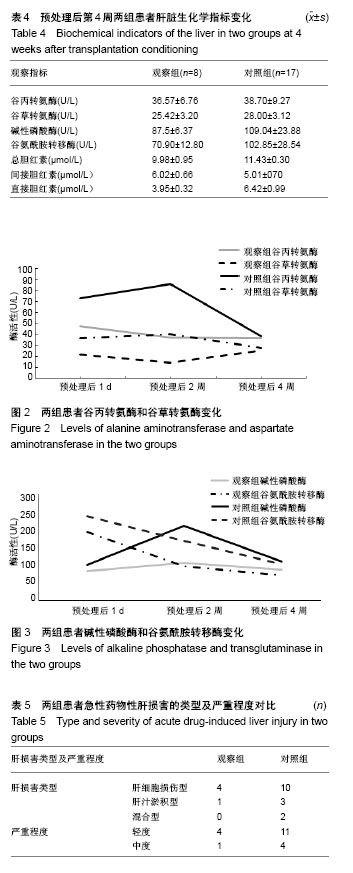| [1] Bernal W, Auzinger G, Dhawan A, et al. Acute liver failure. Lancet. 2010;376(9736):190-201.[2] Chang YJ, Zhao XY, Huang XJ. Strategies for Enhancing and Preserving Anti-leukemia Effects Without Aggravating Graft-Versus-Host Disease. Front Immunol. 2018;9:3041.[3] 罗小雨,刘海林.骨髓间充质干细胞的免疫调节功能及其在治疗肝脏疾病中的应用[J].中华消化杂志,2013,33(9):643-646.[4] 孙文静,刘凯军,文良志,等.骨髓间充质干细胞对肝脏的影响[J].实用肝脏杂志,2017,20(40):394-396.[5] 张秋艳,熊艳,叶殷发.骨髓间充质干细胞修复肝脏缺血-再灌注损伤研究进展[J].中华实验外科杂志,2016,33(1):871-875.[6] 侯一琚,王丽萍,许烂漫,等.骨髓间充质干细胞移植对急性肝功能衰竭大鼠肝脏信号转导子和转录活化子3表达的影响[J].中华传染病杂志,2014,32(1):13-18.[7] 张丽霞,严祥.骨髓间充质干细胞移植在肝脏疾病中的应用[J].国际消化病杂志,2016,36(1):43-46.[8] 王晓媛,李栋,周盼盼,等. 人脐带间充质干细胞治疗环磷酰胺导致的大鼠药物性肝损伤[J].世界华人消化杂志,2017, 25(33): 2956-2966.[9] 陈良,冯啸,袁泽南,等.人脐带间充质干细胞来源的外泌体对肝脏再生的影响[J].中华实验外科杂志, 2017,34(10) : 1684-1687.[10] 马军.血液病患者药物性肝损害的预防和规范化治疗专家共识(2016版) [J].中华血液学杂志,2016,37(6):441-453.[11] Babaei A, Katoonizadeh A, Ranjbar A, et al. Directly injected native bone-marrow stem cells cannot incorporate into acetaminophen-induced liver injury. Biologicals. 2018;52: 55-58.[12] Zhao Z, Leow WQ. Concurrent Hepatic Tuberculosis and Hepatic Graft-versus-host Disease in an Allogeneic Hematopoietic Stem Cell Transplant Recipient: A Case Report. Transplant Proc. 2017;49(7):1659-1662.[13] Alessandrino F, Tirumani SH, Krajewski KM, et al. Imaging of hepatic toxicity of systemic therapy in a tertiary cancer centre: chemotherapy, haematopoietic stem cell transplantation, molecular targeted therapies, and immune checkpoint inhibitors. Clin Radiol. 2017;72(7):521-533.[14] Hu M, Li S, Menon S, et al. Expansion and Hepatic Differentiation of Adult Blood-Derived CD34+ Progenitor Cells and Promotion of Liver Regeneration After Acute Injury. Stem Cells Transl Med. 2016;5(6):723-732.[15] Phinney DG, Pittenger MF. Concise Review: MSC-Derived Exosomes for Cell-Free Therapy. Stem Cells. 2017;35(4): 851-858.[16] Kusuma GD, Carthew J, Lim R, et al. Effect of the Microenvironment on Mesenchymal Stem Cell Paracrine Signaling: Opportunities to Engineer the Therapeutic Effect. Stem Cells Dev. 2017;26(9):617-631.[17] 姜华,高建鹏.骨髓间充质干细胞治疗肝脏疾病研究进展[J].实用肝脏病杂志,2015,18(2):217-221.[18] Margini C, Vukotic R, Brodosi L, et al. Bone marrow derived stem cells for the treatment of end-stage liver disease. World J Gastroenterol. 2014;20(27):9098-9105.[19] 郭世民,魏巍. 间充质干细胞用于肝纤维化及肝硬化治疗的研究进展[J].肝脏,2017,22(6):551-554.[20] 冯兰艳,张大志. 间充质干细胞在慢加急性肝衰竭中的临床应用及研究进展[J].中华肝脏病杂志,2017,25(9) : 651-654.[21] 张迪,张雅敏,刘子荣,等. 间充质干细胞在自身免疫性肝病中的应用[J].实用器官移植电子杂志,2017,5(1):56-60.[22] 薛红利,曾维政. 不同来源间充质干细胞在肝病治疗中应用的研究进展[J]. 世界华人消化杂志, 2013, 21(11): 990-995.[23] 骆海飞,杨小安,张卡,等.人脐带间充质干细胞治疗乙肝肝硬化失代偿期疗效观察[J].中华实验和临床病毒学杂志, 2015,29(3) : 239-241.[24] 陈振娟,曲乃方. 间充质干细胞移植治疗终末期肝衰竭研究进展[J]. 中国肝脏病杂志(电子版),2017,9(1):7-10.[25] Peng L, Xie DY, Lin BL, et al. Autologous bone marrow mesenchymal stem cell transplantation in liver failure patients caused by hepatitis B: short-term and long-term outcomes. Hepatology. 2011;54(3):820-828.[26] Zhang Z, Lin H, Shi M, et al. Human umbilical cord mesenchymal stem cells improve liver function and ascites in decompensated liver cirrhosis patients. J Gastroenterol Hepatol. 2012;27 Suppl 2:112-120.[27] Wang L, Li J, Liu H, et al. Pilot study of umbilical cord-derived mesenchymal stem cell transfusion in patients with primary biliary cirrhosis. J Gastroenterol Hepatol. 2013;28 Suppl 1:85-92.[28] 奉婷,朱卫民,余泽波. 脐血间充质干细胞治疗肝病的研究进展[J]. 国际消化病杂志,2013,33(3):176-178.[29] Jiang W, Tan Y, Cai M, et al. Human Umbilical Cord MSC-Derived Exosomes Suppress the Development of CCl4-Induced Liver Injury through Antioxidant Effect. Stem Cells Int. 2018;2018:6079642.[30] Chen L, Zhang J, Yang L,et al. The Effects of Conditioned Medium Derived from Mesenchymal Stem Cells Cocultured with Hepatocytes on Damaged Hepatocytes and Acute Liver Failure in Rats. Stem Cells Int. 2018;2018:9156560. |
